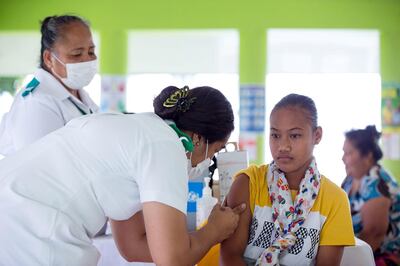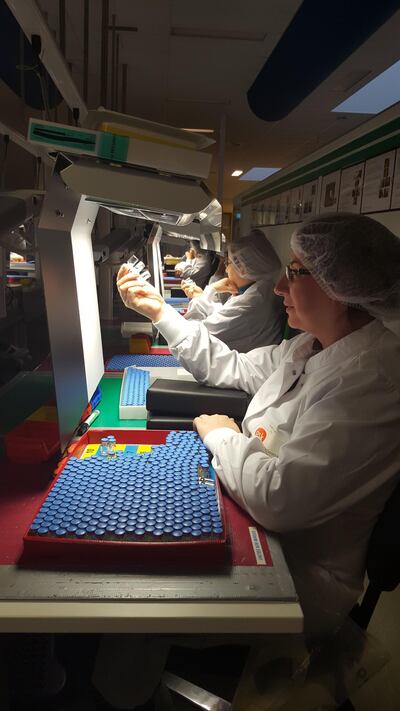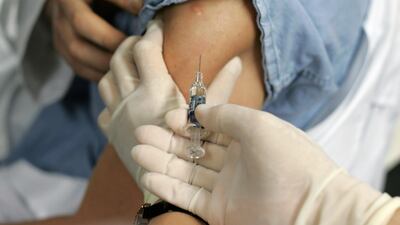A surge in global anti-vaccination campaigns is leaving children vulnerable to dangerous diseases, experts said.
While the UAE has a high percentage of vaccine uptake, thanks to the national childhood immunisation programme, other countries lag well behind international recommendations.
The National was offered an exclusive inside look at the stringent process of vaccine production by the world's largest manufacturer, GlaxoSmithKline.
Scientists at the research and development site near Brussels hope to dispel myths about supposedly unsafe vaccines in what is a tightly regulated industry.
“It is a concern to see that you have some irresponsible people using social media to diffuse information that is wrong,” said Emmanuel Hanon, senior vice president head of research and development at GSK Vaccines.
“The public has the right to know the risks and benefits around vaccines. Nobody should claim vaccines are totally without risk. It is like driving your car; accidents can happen.”
“But the way vaccines are developed and the difficulty in getting government approvals have to be in favour of the benefit rather than the risk,” he said.
A recent measles outbreak in Samoa infected nearly 5,500 people and claimed the lives of 77, mostly children, highlighting the dangers of unvaccinated communities.

Samoa’s low vaccination rates have been blamed on a lack of trust after the deaths of two children last year who were given an incorrectly prepared dose. Since the outbreak, the Samoan government has vaccinated 94 per cent of the population.
The World Health Organisation said global measles deaths have declined since the 1960s thanks to effective vaccination programmes.
But since 2017, fatalities resulting from the illness have risen, with anti-vaccination messaging being singled out as a possible cause.
Other factors deterring parents from protecting their children from illness are cultural beliefs and access to effective vaccines.
The Department of Health Abu Dhabi said the number of vaccinated children has increased by 12 per cent since 2015. In 2018, about 1.4 million doses were delivered to children in Abu Dhabi.
Vaccines are strictly monitored by the Abu Dhabi Centre of Public Health to ensure standards continue to be met.
A high coverage of polio vaccination in the UAE has ensured the disease has been eliminated from the emirates as of 2004.
Cases of other common preventable diseases have also declined since the introduction of the National Immunisation Program in 1981.
The US Centres for Disease Control said the increase in international travel has also increased the spread of potentially fatal disease in unvaccinated populations.
Vaccines have become one of humanity’s great successes, almost eliminating diseases such as measles, smallpox, whooping cough and rubella that once devastated huge populations of children.
But scientists warn of a creeping hesitancy in some nations.

“A change in culture can manifest that results in a drop in vaccine coverage,” said Ivo Vojtek, from the vaccine science and global medical affairs department at GSK Vaccines.
“In the whole of Europe, Scandinavian countries are performing better, with 70 to 80 per cent of populations considering [vaccines] safe, but there are problems in central European and eastern European countries where uptake is 40 to 50 per cent.
“In America and Asian counties, there is a higher uptake because the disease burden is still present.
“Looking at vaccine confidence with a perception of safety, it is clear it is dropping, with France having one of the lowest perceptions of vaccine safety in the world.”
Experts are unsure why scepticism remains in some communities, although Mr Vojtek said some populations are more vulnerable to misinformation than others.
Read More
Measles surge prompts vaccination appeal ahead of busy festive travel season
World Aids Day: Drug research has transformed treatment for HIV patients
UAE doctors urge residents to request latest flu vaccine
“We have seen a number of cases in France with parents delaying doses or modifying the schedule for their children,” he said.
“This is why the French government has decided to go for mandatory vaccination.
“Social media does play a role. It is an exchange where mothers will often share their experiences and views with other mothers, which impacts behaviour. But the reach does not always equal the impact on decision making so there are more factors than just social media.”
Denmark, Ireland, South Korea and Japan are four nations that share similar attitudes towards the HPV vaccination in girls.
The vaccine protects against cervical cancer but vaccination rates plummeted in 2017 after misinformation spread on social media.
Since 2016, GSK has been hosting UAE events for healthcare professionals in partnership with the Ministry of Health and Prevention to raise awareness about vaccine hesitancy.
Lessons aimed at helping doctors better communicate with patients and how to address their concerns.


